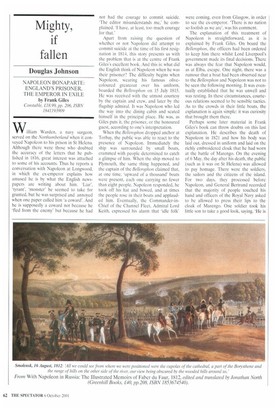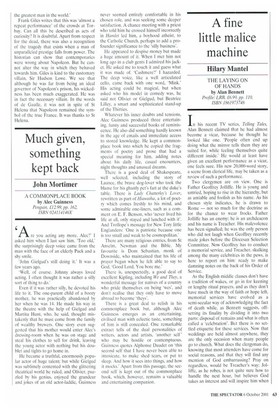Mighty, if fallen
Douglas Johnson
NAPOLEON BONAPARTE: ENGLAND'S PRISONER, THE EMPEROR IN EXILE by Frank Giles Constable, £18.99, pp. 206, ISBN 1841193909 William Warden, a navy surgeon, served on the Northumberland when it conveyed Napoleon to his prison in St Helena. Although there were those who doubted the accuracy of the letters that he published in 1816, great interest was attached to some of his accounts. Thus he reports a conversation with Napoleon at Longwood. in which the ex-emperor explains how amused he is by what the English newspapers are writing about him. 'Liar'. 'tyrant', 'monster' he seemed to take for granted, but he was surprised and annoyed when one paper called him 'a coward'. And he is supposedly a coward not because he 'fled from the enemy' but because he had not had the courage to commit suicide. 'The editor misunderstands me,' he complained. 'I have, at least, too much courage for that.'
Apart from raising the question of whether or not Napoleon did attempt to commit suicide at the time of his first resignation in 1814, this story presents us with the problem that is at the centre of Frank Giles's excellent book. And this is: what did the English think of Napoleon when he was their prisoner? The difficulty begins when Napoleon, wearing his famous olivecoloured greatcoat over his uniform, boarded the Bellerophon on 15 July 1815. He was received with the utmost courtesy by the captain and crew, and later by the flagship admiral. It was Napoleon who led the way into the dining cabin and seated himself in the principal place. He was, as Giles puts it, the prisoner, or the honoured guest, according to one's interpretation.
When the Bellerophon dropped anchor at Torbay, the public was able to react to the presence of Napoleon. Immediately the ship was surrounded by small boats, crammed with people determined to catch a glimpse of him. When the ship moved to Plymouth, the same thing happened, and the captain of the Bellerophon claimed that, at one time, 'upward of a thousand boats were present, each one carrying no fewer than eight people. Napoleon responded, he took off his hat and bowed, and at times the people rose in their boats and applauded him. Eventually, the Commander-inChief of the Channel Fleet, Admiral Lord Keith, expressed his alarm that 'idle folk' were coming, even from Glasgow, in order to see the ex-emperor. 'There is no nation so foolish as we are', was his comment.
The explanation of this treatment of Napoleon is straightforward, as it is explained by Frank Giles. On board the Bellerophon, the officers had been ordered to keep him there whilst Lord Liverpool's government made its final decisions. There was always the fear that Napoleon would, as at Elba, escape. One night, there was a rumour that a boat had been observed near to the Bellerephon and Napoleon was not to be seen the following morning. It was eventually established that he was unwell and was resting. In these circumstances, courteous relations seemed to be sensible tactics. As to the crowds in their little boats, the explanation is again simple: it was curiosity that brought them there.
Perhaps some later material in Frank Giles's book can throw doubts on this last explanation. He describes the death of Napoleon in 1821 and how his body was laid out, dressed in uniform and laid on the richly embroidered cloak that he had worn at the battle of Marengo. On the evening of 6 May, the day after his death, the public (such as it was on St Helena) was allowed to pay homage. There were the soldiers, the sailors and the citizens of the island. For two days, they processed before Napoleon, and General Bertrand recorded that the majority of people touched his hand and officers of the Royal Navy asked to be allowed to press their lips to the cloak of Marengo. One soldier took his little son to take a good look, saying, 'He is
the greatest man in the world.'
Frank Giles writes that this was 'almost a repeat performance' of the crowds at Torbay. Can all this be described as acts of curiosity? It is doubtful. Apart from respect for the dead, there was also a recognition of the tragedy that exists when a man of unparalleled prestige falls from power. The historian can show that contemporaries were wrong about Napoleon. But he cannot alter the way in which they behaved towards him. Giles is kind to the customary villain, Sir Hudson Lowe. We see that although he was far from being an ideal governor of Napoleon's prison, his wickedness has been much exaggerated. He was in fact the necessary villain. In the words of de Gaulle, it was not in spite of St Helena that Napoleon remained the symbol of the true France. It was thanks to St Helena.



































































































 Previous page
Previous page